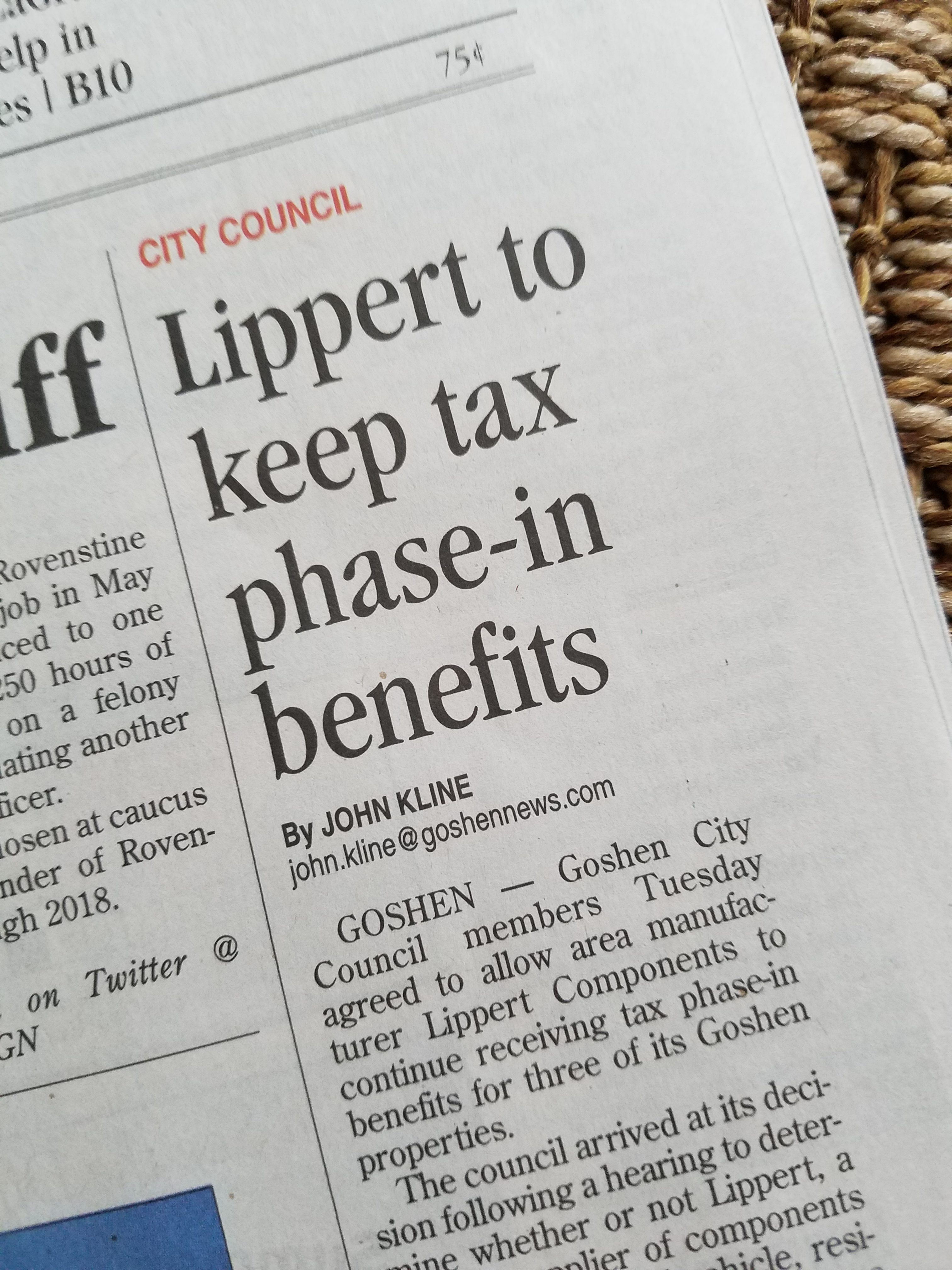 A couple of people have asked about Tuesday’s tax phase-in compliance hearing. I’m unlikely to remember the entire conversation accurately, so I won’t even try. If you want a complete play-by-play of the June 20th City Council meeting, I suggest you listen to the audio (available through the Clerk-Treasurer’s office). Here, I’ll just explain the reasoning behind my own vote. If that interests you, read on…
A couple of people have asked about Tuesday’s tax phase-in compliance hearing. I’m unlikely to remember the entire conversation accurately, so I won’t even try. If you want a complete play-by-play of the June 20th City Council meeting, I suggest you listen to the audio (available through the Clerk-Treasurer’s office). Here, I’ll just explain the reasoning behind my own vote. If that interests you, read on…
The vote on Lippert’s tax phase-in was harder than I expected. I ended up voting to discontinue the reduced tax rate (because they were 70 jobs short of the target at the specified sites, which represents over 2 million dollars in wages); but it’s worth saying that I came close to voting the other way. Lippert is a valued company that provides many jobs in Goshen. We’re fortunate to have them here. City-wide, their employment numbers are high, but I felt it was important to stay focused on the original agreement — keeping the abatement attached to the results at the named sites.
Despite my vote (and Councilman Scharf’s), the majority voted to continue the tax abatement. While I came down on one side, I can understand why some voted differently than I did. There were some valid arguments to be made for continuing the abatement (but I’ll let those who supported that position make their own case).
One reason I voted the way I did is because the organization is so financially top-heavy. While companies have the right to provide compensation as they see fit, when I’m asked to determine if there’s been a genuine effort to fill positions that pay $13 and $14 an hour, the compensation higher up the chain begins to seem relevant. Last year at Lippert, the CEO was compensated over 9 million dollars — which is about 320 times more than their entry level workers are paid. To my eyes, a genuine effort to fill entry level jobs would include raising the wages at the bottom (to what number, I don’t know). The company has raised wages, but if jobs remain unfilled, I’d argue that the marketplace is sending a message that they need to go even higher. Again, it’s a company’s right not to do that. But when taxes come into play, it invites a larger conversation about when and where to target tax dollars and tax reduction agreements.
Some basic background research led me to (among other things) a piece in Fortune magazine that argued that CEO pay shouldn’t exceed 20 times that of a worker. The author credited a pioneer of management science named Peter Drucker for that particular number. Drucker maintained that exceeding a 20-to-1 CEO-to-worker pay ratio damages company morale and productivity. I can’t verify this as fact, but it rings true — and it aligns with data that show Americans (of all political persuasions) want a smaller pay gap between CEOs and workers.
Here’s an excerpt from a Scientific American article on the subject of CEO-to-worker pay (dated March 31, 2015):
In a study published last year, Norton and Sorapop Kiatpongsan… asked about 55,000 people from 40 countries to estimate how much corporate CEOs and unskilled workers earned. Then they asked people how much CEOs and workers should earn. The median American estimated that the CEO-to-worker pay-ratio was 30-to-1, and that ideally, it’d be 7-to-1. The reality? 354-to-1. Fifty years ago, it was 20-to-1. Again, the patterns were the same for all subgroups, regardless of age, education, political affiliation, or opinion on inequality and pay. “In sum,” the researchers concluded, “respondents underestimate actual pay gaps, and their ideal pay gaps are even further from reality than those underestimates.””
In my experience, Goshen is right in line with these findings. Even strong business supporters are less-than-enthusiastic about reducing taxes for companies with highly compensated CEOs. I can’t count the jaws I’ve seen drop over the number 9 MILLION.
In the end, I was uncomfortable voting to continue what felt like subsidizing an unpopular practice.
And let’s remember that the whole point of taxation is to provide crucial infrastructure and services within the city (safe drinking water, fire and police protection, roads, parks, etc.), things we all use. In other words, taxes aren’t intended as a punishment to avoid, but an opportunity to make a valuable community contribution.
Again, Goshen is fortunate to have Lippert. I’m grateful for what the company provides — and for the enthusiasm and intelligence I saw in the eyes of the men who led Councilman McKee and me on a tour of plant 85. They said emphatically that people matter more than profits at their company. I believe them. And I believe they will be successful with or without a tax phase-in. So when the numbers didn’t line up precisely with the written phase-in agreement, I voted to discontinue it.
I am so glad that you’re on city council. Thanks for doing the right thing.
Thanks for the encouragement, Daniel. And for your years on council!
You make excellent and convincing points!
Thanks for saying so, Karl. I try. 🙂
Thanks for sharing the rationale for your vote. What I most appreciated was that you did not vote just because it felt right, but you actually did some research on which to base your vote. It makes perfect sense to me!
Thanks so much for your feedback, Lynette.